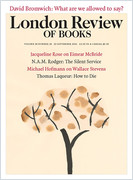What are we allowed to say?
Two contradictory thoughts now dominate the Anglo-American approach to feelings in the context of public debate. For the speaker, feelings must be restrained – a neutral style of rational euphemism is recommended. On the other hand, the emotion felt by the listener in response to a speech must be treated as authoritative, unarguable, closed to correction or modification by other witnesses. More
Eimear McBride
The Lesser Bohemians, McBride’s second novel, sets itself a challenge: how on earth does anyone ever manage to talk to somebody else? How close in language can, or should, you try to get? The issues of sexual, and of linguistic, proximity turn out to be one and the same thing. McBride has said that in writing and rewriting the novel, she was most worried about the representation of sex: ‘Actually,’ she then qualifies, ‘it was really about trying to maintain the connection between the inner life and the physical life.’ What makes this novel so powerful is the way she jams the bodies into the speech. More
Wallace Stevens
To think about Stevens’s life, or Stevens from the perspective of his life, is to be told that your bird of paradise, your parrot or your quetzal, is actually a pigeon or a Farmer Matthews turkey. Nothing in writing has the full-on charm of early Stevens, the abundance of colours and scents and sounds, the musical instruments and fruit, and – oh, just the abundance of abundance. He has the nattiest titles, the most full-throated ejaculations (the ‘Pardie!’ and ‘quotha’ and ‘Ti-lill-o’, the ‘Tum-ti-tum,/Ti-tum-tum-tum!’ and the ‘Ohoyaho,/Ohoo’), the wildest cast of characters, the most beguiling locations. More
LATEST AUDIO AND VIDEO
VIDEO This mess
John Lanchester talks to George Monbiot about the state we’re in. Watch »
VIDEO Fruit flies and juniper berries
Steven Rose on the experiments behind epigenetics. Watch »






